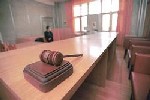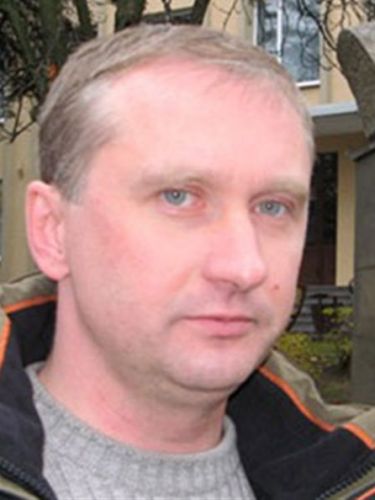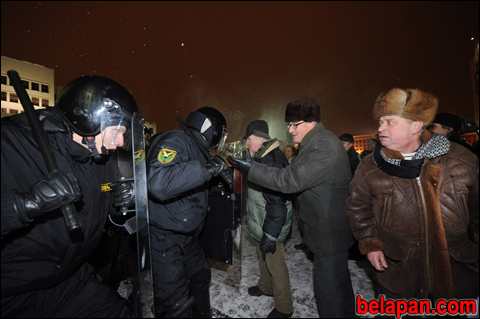 The criminal trials for protests against the results of the presidential elections 19 December 2010 in Minsk started on 17 February. With charges brought against 42 people, Vasil Parfiankou, Aliaksandr Malchanau, Zmitsier Novik and Aliaksandr Atroshchankau have already been sentenced to 3 to 4 years imprisonment. Two more trials were held on 10 March. As a result of these trials Dzmitry Miadzvedz has been said to personal restraint for 3 years and $3000 fine was imposed upon Russian citizens Artiom Breus and Ivan Gaponov.
The criminal trials for protests against the results of the presidential elections 19 December 2010 in Minsk started on 17 February. With charges brought against 42 people, Vasil Parfiankou, Aliaksandr Malchanau, Zmitsier Novik and Aliaksandr Atroshchankau have already been sentenced to 3 to 4 years imprisonment. Two more trials were held on 10 March. As a result of these trials Dzmitry Miadzvedz has been said to personal restraint for 3 years and $3000 fine was imposed upon Russian citizens Artiom Breus and Ivan Gaponov.
According to press-secretary of Belarusian MFA Andrei Savinykh, the country officials invited OSCE experts to observe the legal proceedings concerning the participants of December 19 events. OSCE intends to send the observers and to publish an open report on the outcomes of the trial with the analysis of everything observed.
 Lawyers repressed
Lawyers repressed
Due to the pressure imposed on the defence lawyers, however, one should not expect the proceedings to be fair and objective. Instead, they can be regarded as an attempt to leave the accused without any real legal defence.
Pavel Sapelka, right, was expelled from Minsk City Bar on March, 3. Under the Law on Advocacy and the Bar, one can be engaged in legal practice only if a member of the Bar. Therefore, now the political prisoners Andrei Sannikau, Pavel Seviarynets, Zmitsier Dashkievich cannot have P. Sapelka’s legal assistance in their 19 December-related criminal cases.
The Ministry of Justice has already tried to hold Pavel Sapelka disciplinary liable for “inappropriate statements” in January. According to Human Rights Centre “Viasna”, Mr. Sapelka was a defender of political prisoners for many years. He set up the defence for Mikola Autukhovich and members of ‘Partnership, a non-registered organisation for observers.
Uladzimir Toustsik, Tamara Harayeva, Aleh Aheyeu and Tatsiana Aheyeva – all four lawyers for accused in 19 December-related cases, have also been disbarred recently. In other words, lawyers displaying willingness to defend political prisoners are systmatically abolished. The likely result is that many lawyers will be afraid of providing legal assistance in “political” cases.
International reaction The international community carefully follows the events in Belarus. The photo-exhibition “December 19 as seen by journalists” has opened on March, 2 in the office of Permanent Representation of Sweden to the EU in Brussels. Kseniya Avimava, Siarhei Balai, Dzmitry Brushko, Uladzimir Hrydzin, Vadzim Zamirouski, Aliaksandr Ziankou and Aliaksei Matsiushkou had presented 46 photos, showing thousands of peaceful protesters, militia and riot police clubbing people, solidarity actions with the detainees.
The international community carefully follows the events in Belarus. The photo-exhibition “December 19 as seen by journalists” has opened on March, 2 in the office of Permanent Representation of Sweden to the EU in Brussels. Kseniya Avimava, Siarhei Balai, Dzmitry Brushko, Uladzimir Hrydzin, Vadzim Zamirouski, Aliaksandr Ziankou and Aliaksei Matsiushkou had presented 46 photos, showing thousands of peaceful protesters, militia and riot police clubbing people, solidarity actions with the detainees.
Countries’ delegations to the UN’s Human Rights Council in Geneva are inquiring whether it is possible to restrain the Belarusian officials from further offence on democratic rights and freedoms. Thanks to the support of the Human Rights House Network and other influential international organisations who have brought eyewitnesses to Geneva, the delegations to the UN have received lots of first-hand information.
“We came to Geneva to give the most recent and objective information to the representatives of member-countries of the UN’s Human Rights Council. We hope to convince them of the need to adopt a resolution on the Belarusian situation and to influence the Belarusian authorities in such a way”, – said the Chair of the Human Rights Center “Viasna” Alies Bialiatski.
“The desperate struggle for democracy in the countries of the Middle East should not overshadow the tragic course of events in Belarus, where the authoritarian government completely ignores human rights and practically has declared war on civil society. It is true that there is no bloodshed in the streets of Belarus today, but we should not wait for it to break out. We need to act now”, said Bialiatski to ambassadors and delegations of several countries during the event in the UN.
The Belarusian delegation consisted of the members of Human Rights Watch and International Observation Mission of the Committee of International Control over the Situation with Human Rights that works in Belarus. Apart from the public side-event, the human rights defenders had informal meetings with representatives of several delegations – among them Argentina, Hungary, the UK, Norway, Poland, Russia, Ukraine, Chile, and Sweden.
The experts note that the international position on Belarus will highly depend on the position of Russia, which expresses serious concern about the human rights violations in Belarus, particularly because of two Russian citizens who were brought to criminal trial together with other peaceful protesters.
Related articles
“Justice” in Belarus: lawyers afraid to defend political prisoners
Belarusian lawyers need moral support amid government’s pressure





